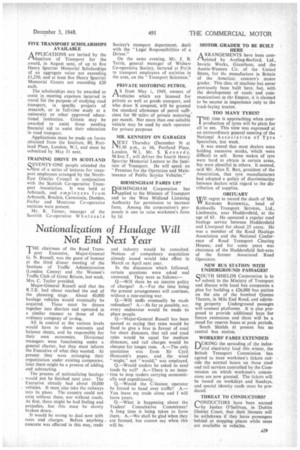Nationalization of Haulage Will
Page 31

If you've noticed an error in this article please click here to report it so we can fix it.
Not End Next Year
THE chairman of the Road Trans
./ port Executive, Major-General G. N. Russell, was the guest of honour at the third dinner meeting of the Institute of Traffic Administration (London Centre) and the Women's Traffic Club of Great Britain, last week. Mrs. C. Taylor presided.
Major-General Russell said that the R.T.E. had about reached the end of the planning stage. About 40,000 haulage vehicles would eventually be acquired. These must be drawn together into districts and operated in a similar manner to those of the ordinary company of to-dav.
All in control at the various levels would have to show accounts and balance sheets, and be responsible for their own economics. Divisional managers were functioning under a general charter, but they must inform the Executive of what they wanted. At present they were arranging their organization under existing companies; later there might be a process of adding and subtracting.
The process of nationalizing haulage would not be finished next year. The Executive already had about 10,000 vehicles. It must also take the railways into its plans. The country could not exist without them, nor without roads. At first, there might be bad feeling and prejudice, but this must be slowly broken down..
It would be wrong to deal now with rates and charges. Before anything concrete was effected in this way, trade and industry would be consulted. Notices of compulsory acquisition already issued would take effect in March or April next year.
In the discussion which followed, certain questions were asked and answered. They were as follows: Q.—Will there be an interim policy of charges? A.—For the time being the present arrangements will continue, without a rate-cutting war.
Q.—Will staffs eventually be made redundant? A.—A's far as possible, no; every endeavour would be made to place people.
Q.—Major-General Russell has been quoted as saying that rates would be fixed to give a bias in favour of road for short distances, that rail and road rates would be equal for medium distances, and rail charges would be cheaper for longer runs. A.—The only quotation was from Sir Cyril Hurcomb's paper, and the, word might," not "would," was employed.
Q.—Would traders be asked to send loads by rail? A.—There is no intention to stop traders carrying economically and expeditiously.
Q.—Would the C-licence operator be forced to hand over traffic? A.— You leave my trade alone and I will leave yours.
Q.—What is happening about the Traders' Consultative Committees? A long time is being taken to form them. A.—We shall be glad when they are formed, but cannot say when this will be.
MOTOR GRADER TO BE BUILT HERE
A RRANGEMENTS have been comripleted by Aveling-Barford, Ltd., Invicia Works, Grantham, and the Austin-Western Co. of the United States, for tlu. manufacture in Britain of the Americar. concern's motor grader. This class ot machine has never previously been built here, but, with the development of roads and communications in the Empire, it is claimed to be secona in importance only to the track-laying tractor.
TOO MANY TYRES?
THE time is approaching when overproduction of tyres will be plain for all to see. This view was expressed at an extraordinary general meeting of the National Association of Tyre Specialists, last week.
It was stated that most dealers were holding excessive stocks, which were difficult to sell. Some makes of tyre were hard to obtain in certain areas, but were plentiful in others. It seemed, said Mr. Alan E. Batt, president of the Association, that tyre manufacturers had adopted a -policy of discriminating between dealers with regard to the distribution of supplies.
OBITUARY
WE regret to record the death of MR. VV RICHARD ROTHWELL, head of Rothwells Transport Services, Ltd., Linthwaite, near Huddersfield, at the age of 63. He operated a regular road haulage service between Huddersfield and Liverpool for about 25 years. He was a member of the Road Haulage Association and the National Conference of Road Transport Clearing Houses, and for some years was chairman of the Huddersfield Sub-area of the former Associated Road Operators.
NEW BUS STATION WITH UNDERGROUND PASSAGES?
SOUTH SHIELDS Corporation is to submit to the Ministry of Transport and discuss with local bus companies a plan for building a £26,000 bus station on the site of the bombed Queens Theatre, in Mile End Road, and adjoining property. Underground passages will connect platforms. It is also proposed to provide additional bays for future extensions and there will be a stand for reserve buses at peak periods.
South Shields at present has no central bus station.
WORKERS' FARES EXTENDED
DURING the spreading of the Indus1-"trial electricity load this winter, the British Transport Commission has agreed to issue workmen's tickets outside the normal hours on those road and rail services controlled by the Commission on which workmen's concessions are now granted. The tickets will be issued on weekdays and Sundays, and special identity cards must be produced.
THREAT TO CONDUCTORS?
CONDUCTORS have been warned by Justice O'Sullivan, in Dublin District Court, that their licences will be withdrawn if they leave passengers behind at stopping places while seats are available in vehicles.




























































































